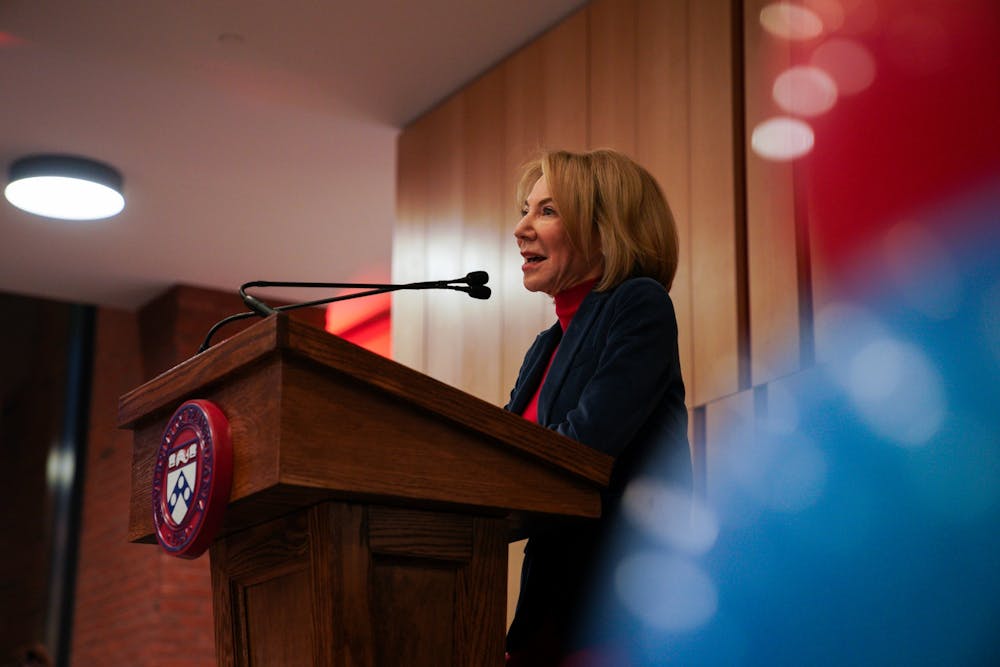
Penn paid former President Amy Gutmann nearly $23 million in 2021, according to recent University tax filings.
The tax filings show that most of Gutmann’s 2021 earnings — $20.3 million — accumulated over the course of her 18-year tenure as president, in the form of deferred compensation and investment gains. The high pay in Gutmann’s final year, which is likely a record single-year compensation for a college president, was first reported by The Philadelphia Inquirer. The University’s most recent tax filings were obtained by The Daily Pennsylvanian.
Gutmann’s base salary in 2021 was $1.56 million, up slightly from $1.54 million in 2020, and she received a bonus of $1 million.
“Dr. Gutmann’s compensation was set by the Trustees of the University using comparative market data and reflects her significant accomplishments and lengthy tenure,” Board of Trustees Chair Scott Bok wrote in a statement to the DP.
Gutmann was previously the highest-paid president in the Ivy League in 2019 and was the fifth-highest paid out of all private college presidents in terms of total pay that year.
A note in the tax filings says that Gutmann’s deferred compensation package was decided upon in her employment agreement, which was approved by the Board of Trustees with the help of a third-party compensation consultant.
“The amounts credited to her annually under these agreements were in recognition of Dr. Gutmann’s outstanding service as Penn’s president, as well as for retention purposes,” the note reads.
Amy Gutmann's 2021 pay included deferred compensation package, investment gains
Deferred compensation is a form of payment that many colleges use to ensure that chief executives, like presidents, stay for long periods of time, according to the Chronicle of Higher Education. If a chief executive is provided with deferred compensation, that means that the University will deposit money into a dedicated fund that the chief executive cannot withdraw from until a certain date.
In this case, had Gutmann left earlier in her 18-year tenure, she would not have received the $20.3 million deferred compensation package. The package was disclosed to the United States Senate during Gutmann's confirmation hearings to become U.S. ambassador to Germany, Bok told the Inquirer.
“The deferred compensation was subject to ‘substantial risk of forfeiture’ meaning that the President was at risk of losing these deferred amounts if she did not meet the goals and milestones agreed to by the Trustee Chair and President during her presidency,” Penn wrote in the tax filing.
In 2017, the highest-paid chief executive of a private college received $5.4 million in his deferred compensation package vested over 15 years, averaging $360,000 each year. By comparison, Penn deposited more than three times that amount each year into Gutmann’s deferred compensation fund, averaging $1.12 million annually.
“[Gutmann’s compensation] reflects long and distinguished service, exceptional all-around performance, and investment gains on deferred compensation over nearly two decades,” Bok said in his statement to the DP.
In response to a request for comment, Vice President for University Communications Stephen MacCarthy wrote to the DP that Gutmann’s deferred compensation package was agreed upon in her starting contract in 2004. By contrast, Penn President Liz Magill — who began her tenure last year — does not currently receive deferred compensation, according to the Inquirer.
Gutmann’s pay has been a subject of scrutiny in the past. During the COVID-19 pandemic, students criticized Gutmann for not taking a pay cut as some departments in the University had to cut programs due to the financial impact of the pandemic.
Rising College junior Selena Rosario, the president of the FGLI Dean's Advisory Board, said she found the payout to Gutmann "baffling" because the University has previously cited money constraints when explaining why it cannot provide more financial aid to students.
She said that making this claim while paying Gutmann a "superfluous" amount in her final year demonstrated that Penn has a cap on how much money it will give aided students, but there is no limit for presidents.
"We're the customers. We're the ones that are paying," Rosario said. "I'm not trying to pay Amy Gutmann. I'm trying to get an education."
Gutmann's tenure spanned both the Great Recession and the pandemic. Among other accomplishments during her presidency, she created a no-loan policy for students on financial aid, oversaw increasing student body diversity, and quintupled the endowment from $4 billion to $20.5 billion. She also led the construction of two college houses as part of the Second-Year Experience, which requires sophomores to live on campus and purchase a meal plan.
"The $22.8 million earned by Amy Gutmann in 2021 represents the largest known amount of compensation ever to have been paid by a college or university to its chief executive within a single year," Chronicle reporter Dan Bauman wrote.
The Daily Pennsylvanian is an independent, student-run newspaper. Please consider making a donation to support the coverage that shapes the University. Your generosity ensures a future of strong journalism at Penn.
Donate






